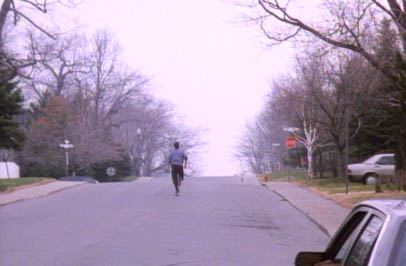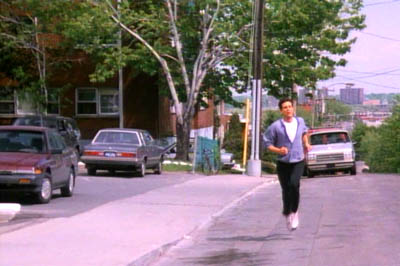|
Scoop's notes Complete spoilers. It's a Holocaust drama. It's a cuddly romance. It's a thriller. It's three {click} three {click} three films in one! Eric Roberts and Diane Lane are just a happy young couple in love in Quebec, but pretending to be in New York, when Eric finds out that his father in law (George C. Scott) was a prison guard at a WW2 concentration camp, a Romanian collaborator with the Nazis, and a participant in some famous historical massacres. The first hints of this discovery kind of cool Eric's ardor and turn him into Mr. Junior G-Man Detective, and it really kind of pisses Diane off when Eric comes back from his investigation and starts crying and screaming like a girly man and shrieking, "Your father's a murderer. Nanny-nanny-boo-boo." But the young lovers do take a break every now and then to sneak off for some kissy-face before continuing the debate about dad's war crimes. No doubt about it, Descending Angel is the Citizen Kane of Holocaust Romantic Comedies. You think that lacks subtlety? Well, Eric has the smooth cunning of Volpone compared to ol' Patton. Just to make the moral dilemma completely lopsided, and allow no shadings at all, the script dictates that George C. not only massacred women and children in the Romanian camps, but continues to order murders to this day when anyone comes close to discovering his secret. Eric even proves that Diane's own mother was locked away in an insane asylum because she found out the secret and was considered a risk of exposure. Since Eric knows the secret, his own life is in danger! But, darn it, for all his high-pitched whining, Eric just can't convince Diane to believe her father is evil, so he seeks out some top-secret evidence files hidden away in some locked cabinets in a church basement. Hey, that makes sense. I know if I had committed war crimes, I would never destroy the evidence. I would keep everything around, just as a souvenir, so I could relive the good times. What the hell, no need to destroy the evidence as long as it's safely locked away in office-strength file cabinets! The silliest part of the whole thing is that Eric doesn't even know for sure that there is anything incriminating in those cabinets. He just breaks into the Church files on spec! There are many cabinets, and everything is written in Romanian, but since the files are all neatly arranged, Eric does find some important double-secret incriminating stuff in about 30 seconds. As he flees from the Church, he is pursued by Patton and two of his toughest Romanian henchmen. Eric is on foot and the henchmen are in a vehicle, so of course our man chooses to make his escape in an open field, even though there is a dense growth of trees nearby that would be easily navigated by a running man, but would prevent a vehicle from passing. Anyway, I suppose you can guess that by the time they get out of the car to gun Eric down, he is running back toward the church, and the bullet zips by him and hits Diane Lane, who has just emerged from the Church to ask her father what is going on. Since George C. did truly love his daughter, and she him, this is apparently enough cinematic justice to give him what he deserves for being the world's most evil man, and the film ends right there, with Diane badly wounded, Patton's hands covered with her blood (get the understated symbolism?), and police and ambulance sirens wailing toward the scene. Did she die? Dunno. Did George C come to trial for his crimes ancient and modern? Dunno. What happened to Eric Roberts? Dunno. That's it, Jack. End of story. Not only is the plot a shameful exploitation of a historical tragedy to create a cheap genre film, but this film is just a confusing mess in many ways. It was made by HBO films in the days before they became the Masters of the Universe, and it's just plain sloppy. You already know about Eric's instant discovery of "important evidence" in unfamiliar files, and his escape through an open field. In addition to such breaches of logic, there are big, obvious, confusing continuity errors that Ed Wood could have spotted. At one point, Eric Roberts goes for his morning run. As he leaves the house it is Winter and all the trees are barren. When we see him a little later, he's running through a tree-lined street, and the leaves have mysteriously returned to all the deciduous trees. (See below.) He is a Phys Ed teacher, so I guess he was in good enough shape to run from Quebec to South Carolina. |
|
|
|
|
|
Eric sets off for the top of the hill .... |
... where he finds a miracle has occurred! |
|
Other scenes seem totally unnecessary. Patton and a henchman take Eric hunting. They wander through the woods. A pheasant is flushed. Shots are fired by Mr. Henchman. The action cuts away to something else, and we never find out why we were watching the hunting scene in the first place. WTF?? I was just watching this with my jaw slack, wondering how such an important theme with such an important and serious actor as George C Scott could possibly have devolved into an erotic thriller. It is not surprising that his film virtually disappeared from the face of the earth for ten years. |
|


